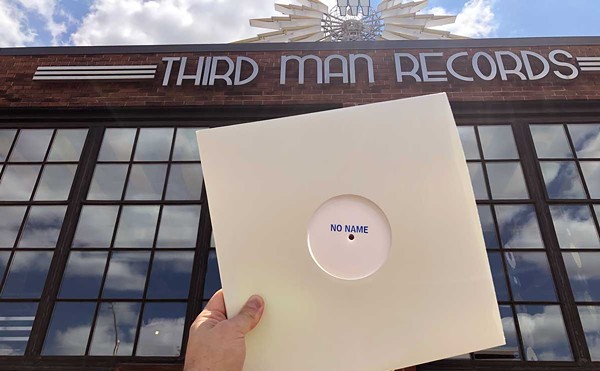Inside an Oak Park recording studio, a director yells, “Action,” and from the shadows, three strippers from 8 Mile Road’s newest “establishment,” City Heat, appear from nowhere and drape themselves over all 260 pounds of one of Detroit most revered rappers. One girl pours a drink and hands it to him. As he begins to laugh uncontrollably, the director yells, “Cut.”
About an hour later, filming for Phat Kat’s commercial is complete. The 30-second spot is promoting his new album The Undeniable LP (Barak Records), one of the best albums to come out of Detroit in what is looking to be a monumental 2004. While the album has been available as a “Detroit Edition” for a few months, the final worldwide version will be released May 25, at which point heads in Duluth or Scottsdale won’t be able to deny the talent inside the dirty district.
A few days after the shoot, he’s in Chicago promoting himself on college and pirate radio stations, and by the time he leaves for a show in Grand Rapids, all are playing tracks from Undeniable. He doesn’t bother with Chicago’s two major urban stations; in fact, he doesn’t need to. He has other theories in his head, and tricks up his sleeve.
“I’m just going through the backdoor, … fuck all the red tape,” Kat says.
To crack and back
Ronnie Watts, 31, grew up on Detroit’s East Side at Jefferson and Conner. His first musical influences included Earth Wind & Fire, Parliament and Michael Jackson, but his first taste of rap, Kurtis Blow’s Christmas Rappin’, blew the budding teen away.
“I was like, wow. He’s rappin’ about Christmas on some ghetto shit,” Kat says.
Then seeing Whodini perform “Freaks Come Out At Night” during 1984’s Freshfest at Joe Louis Arena, little Ronnie found his calling.
“I wrote for myself,” Kat remembers. “I’d be in my own little zone with my headphones on, like a sponge soaking everything up.”
He immersed himself in LL Cool J, Big Daddy Kane, Rakim; he grew up with hip hop when the genre itself was growing. By his senior year at Southeastern High School, Ronnie self-produced his first recording, “The Lyricist,” sampling Harold Melvin and the Blue Notes.
Ronnie earned his title from the mechanic who fixed his car — weekly. When it became clear Ronnie would be a regular, the mechanic promised him a name upon his next visit — and Phat Kat was born. Now, the high school senior in the piece-of-junk yellow hatchback with “killer sounds” was ready to tackle the world. Unfortunately, Detroit wanted to tackle him first. Crack fever was rampant in Kat’s neighborhood.
“Shit was crazy as hell,” recalls Kat. “Cats was getting shot. There was a lot of killings at that time. I couldn’t even focus on my own shit.”
The situation around Kat left him so confused, he dropped out of school a few credits shy of graduation. Kat felt he was better off focusing on his writing, focusing on “what crack was doing to the community, and how that shit related to everyday life.”
But like many in the hip-hop game, Kat hustled “that shit” himself, proving successful enough to move across town in 1993.
“The West Side was still the hood, but compared to East Side life, I felt like I was living in Bloomfield Hills,” he says. “I started meeting cats other than hustlers. They respected MC’ing, and that allowed me to open up and blossom. I learned that there was more to this than killin’ and gangsta shit.”
Although Kat remains guarded in discussing it, he says he felt some sort of “divine intervention … some real shit … a real revelation” that made him abandon hustling that November.
As he turned his energy to rap, it was the end of one life and the beginning of another.
Stages of history
After a chance meeting with Gangstarr’s Guru and DJ Premier at a Detroit record store in 1995, the group put Kat in touch with Pay Day Records. The label signed him to a singles deal under the moniker 1st Down; Slum Village member Jay Dee handled production while Kat was MC. They’d met a year earlier at the Rhythm Kitchen, a landmark in Detroit hip-hop folklore.
“We had that chemistry. … It just sounds so right,” Kat says.
Pay Day’s roster included Group Home, Showbiz & AG, UTD (Mos Def’s original outfit before going solo), and a young upstart by the name of Jay-Z, but the label folded only weeks after releasing 1st Down’s only 12-inch, A Day Wit the Homiez/Front Street. The track did get slight airplay on Detroit radio, but never got its just due.
Back in the trenches, Kat continued recording with Jay Dee, “building up the arsenal,” in hopes of another label deal. Meanwhile, Slum Village were already making a name for themselves, and asked Kat to open up for them on A Tribe Called Quest’s farewell tour. Kat was witness to hip-hop history: a monumental group’s demise and another’s ascension.
By 2000, Kat was “sittin’ on a gang of songs” with no label. He had heard that Detroit’s DJ House Shoes was looking to add executive producer to his résumé. The two met up, and Kat felt an instinctive connection.
From Kat’s material, Shoes put together the classic 12-inch Dedication to the Suckers. Its first run of 6,000 sold out immediately and grabbed the attention of super producer-MC Pete Rock, who invited Kat out to New York. The two spent a week together, simply hanging out, “just kickin’ it,” Kat remembers.
Suckers ended up selling 9,000 copies, one of which landed in the lap of Roots drummer ?uestlove, who was also impressed. Kat was invited out to Philadelphia, where he spent two weeks “kickin’ it.” He ended up rehearsing with the Roots, and joined the group’s 2001 Okayplayer tour along with Slum Village. He considers the tour one of the single most important events in his life due to the relationships formed and lessons learned from the artists surrounding him, including Tribe’s Phife, Slum, Bahamadia, Dead Prez, Talib Kweli, and Black Thought of the Roots.
“It was just priceless,” Kat recalls. “It turned me into the total package. I was becoming all-terrain.”
All that stood in the way of happiness was a record deal. On his own he put out The Phat Kat Discography, a retrospective that combined his early 12-inches, remixes and live tracks from his tours. Coincidentally, Virgin UK was hungry for a piece of the Detroit pie and snatched the rapper up. But it wasn’t the hoped-for breakthrough. Just before the release of his full-length, the label’s entire staff was fired. Kat was able to obtain his masters, but otherwise he was back on square one.
Finally Barak Records founder RJ Rice Sr. stepped in. He’d known Kat for years, through their connection to Slum. Furthermore, Kat had been a longtime supporter of Rice’s namesake son, RJ Jr., even back years ago when other Detroit artists were laughing at the then-teenaged RJ Jr. Now RJ Jr. and his production partner Black Milk have produced more than 80 percent of The Undeniable LP.
Laced with “tenacious, aggressive flows” — to use one of Kat’s phrases — the disc documents the rapper’s personal struggles and journey to this point. It’s an honest account of a homegrown talent unwilling to sell his art short. Nor is he timid about tackling issues from Detroit’s lack of recognition on the global stage to the inaccuracies of Eminem’s 8 Mile to wannabe MCs receiving undeserved attention.
It’s a rap
Kat is not without faults. Like many Detroit MCs, he projects cockiness and arrogance, a thick, thuggish exterior formed by years of let-downs, shit-talking and hard knocks. And he’s sick of the all the useless beefs between local artists.
“For one, artists in Detroit have never been unified,” Kat says. “Their production and lyrical content is not up to par. … They can’t take constructive criticism. If they hear something they don’t like, they likely to shoot you.”
As for himself, he says: “I’m one of the founders of Detroit hip hop, a living legend. Everything about me is Detroit, from the beats to the lyrics to the artists on my album. I’m really just trying to hold up everyone and everything right now.”
The Detroit edition of The Undeniable LP is available from barakrecords.com.
David Valk is a Detroit-area freelance writer. E-mail letters@metrotimes




